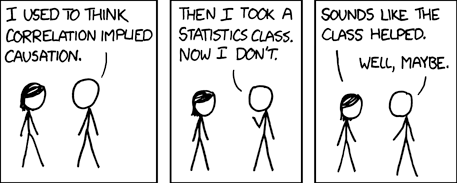OT-SC-WS-08 | Causal learning
Registration closed
Prof. Dr. Vanessa Didelez

Many data analyses ultimately aim at answering causal research questions: We may want to assess and quantify the potential effects of certain decisions, interventions or policies, e.g. will a sugar tax or more playgrounds reduce childhood obesity? will participation in a special training programme for the unemployed increase the chances of finding employment? is a national mammography screening programme actually helpful in preventing deaths from breast cancer?
Such questions are about causal relations and go beyond mere prediction; in fact, methods that are optimised for prediction will give biased results for causal targets. Especially we use non-experimental, i.e. observational data to try and answer questions about causal relations, tailored methods relying on specific assumptions are called for - any data analyst should have a basic awareness of these.
Ultimately, causal learning from data is relevant, for instance, for decision making by public health authorities or policy makers in general, as well as at individual level.
Contents
The course will give a basic introduction into the main concepts, fundamental assumptions and basic principles of key methods for causal learning.
We will cover terminology and central concepts such as potential outcomes, counterfactual prediction, causal diagrams, the target trial principle
- Basic methods for estimation, such as inverse-probability weighting, standardisation / g-formula, as well as checks, e.g. for balance and overlap
- A taste of causal random forests and double machine learning of causal effects
- Basic algorithms for causal discovery, such as the PC- and IDA-algorithms
Outcomes
At the end of the course, the participants will be able to employ potential outcomes notation and causal diagrams to represent prior causal knowledge, identify key structural assumptions as well as potential sources of bias (such as confounding or selection)
- Apply methods for learning (or estimating) causal effects of hypothetical interventions using the appropriate data analytic tools and assess the plausibility of required assumptions
- Apply basic alogrithms for causal discovery (structure learning) to real-world data, while appreciating their strengths and weaknesses.
Prior knowledge
A basic knowledge of statistical data analysis and familiarity with R will be helpful.
Requirements
- Brain, coffee
- PC/laptop or similar
- For online format a second screen might be beneficial
- Didelez, V (2018). Chapter: Causal concepts and graphical models. In: Handbook of Graphical Models, 353-380, CRC-Press --- available from the author upon request
- Foraita, R, Friemel, J, Günther, K, Behrens, T, Bullerdiek, J, Nimzyk, R, Ahrens, W and Didelez, V (2020). Causal discovery of gene regulation with incomplete data. J. R. Stat. Soc. A, 183: 1747-1775. https://doi.org/10.1111/rssa.12565
- Witte, J, Didelez, V. (2019). Covariate selection strategies for causal inference: Classification and comparison. Biometrical Journal; 61: 1270– 1289. https://doi.org/10.1002/bimj.201700294
Book (free to download):
- Hernán MA, Robins JM (2020). Causal Inference: What If. Boca Raton: Chapman & Hall/CRC.

![[Translate to English:] Öffnet Startseite der U Bremen Research Alliance](/fileadmin/user_upload/sites/research_alliance/logo/UBRA_Logo.png)
